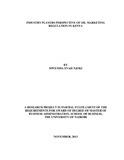| dc.description.abstract | In the recent past, the Kenyan oil industry has been going through competitive times with myriad of activities taking place including exploration, importation, exportation and refining of crude oil.. To protect the interests of consumer, investor and other stakeholder interests, Energy Regulatory Commission (ERC) was established under the Energy Act, 2006. with set objectives and functions among them to regulate the electrical energy, petroleum and related products, renewable energy and other forms of energy. With fuel price being dictated by ERC, oil marketers‟ strategies to remain competitive has therefore to be guided by this. The objective of this study was to determine the industry players perspective of oil marketing regulation in Kenya as well as to determine the ideal regulation models as perceived by the oil marketers in Kenya. The main players in the petroleum sector include the Kenya Pipeline Company (KPC), KPRL and the various petroleum companies involved in the distribution of petroleum products commonly known as Oil Marketing Companies (OMCs) and The Energy Regulatory Commission (ERC) mandated to regulate the energy industry.. The study has been presented through five chapters and sections through which the researcher has discussed the above issues. Twenty four respondents were selected from the senior level of each of the companies selected for the research. Questionnaires were administered to the respondents and analyzed through quantitative statistics. The study established that the oil companies have been affected by price regulation by ERC in different ways. The study‟s implication to policy makers is that industry regulation is a valuable tool that can be utilized in order to protect the consumers as well as protect the interest of investors but only if it is well implemented, the findings of this research will also form the basis for further research. The findings should be understood and evaluated in the light of the limitations of the study. Recommendations to make the industry regulation a better tool for growth in any economy are highlighted. Suggestions for further research are also given | en |

